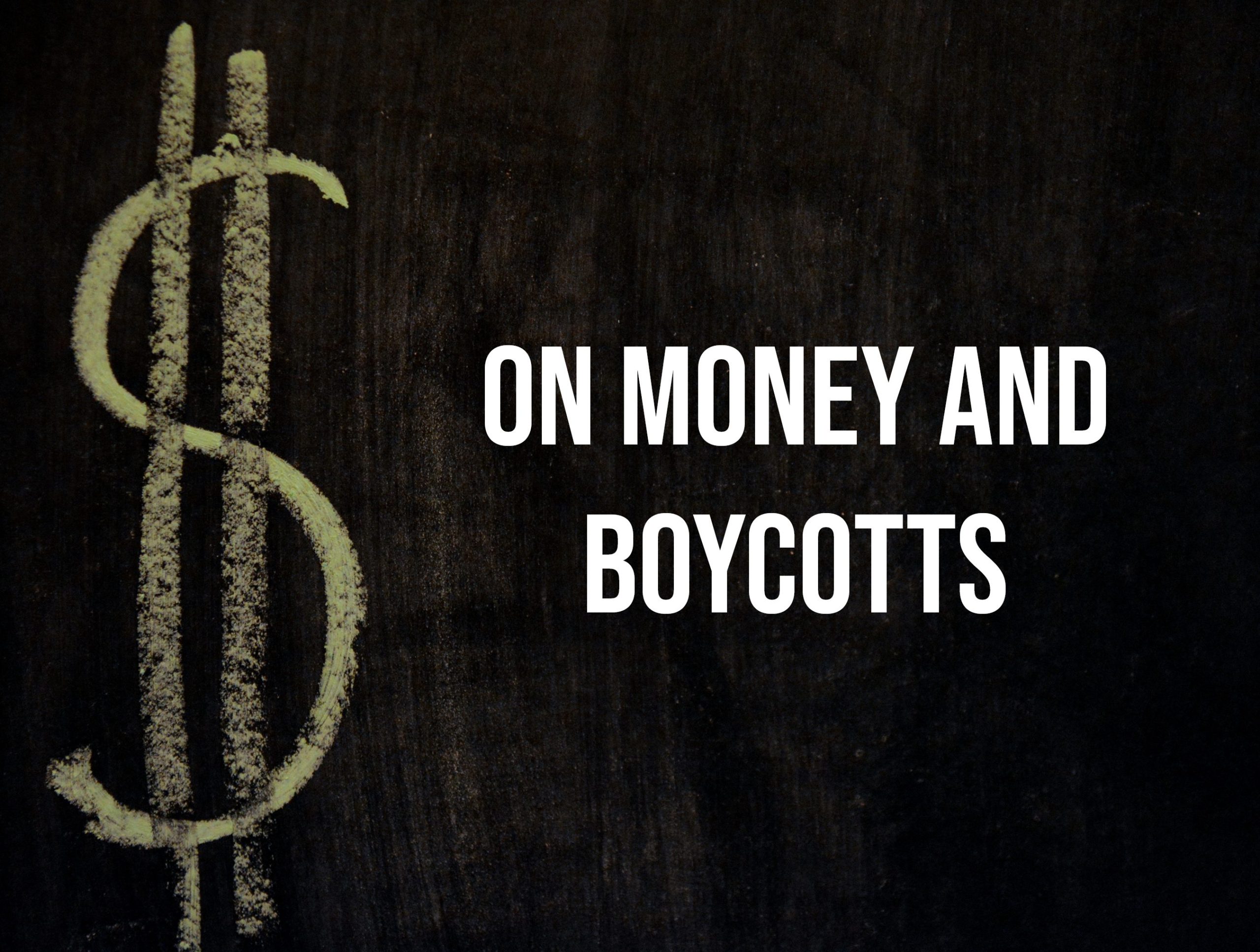
by Pastor Michael Salemink
Mom always said to wash our hands after handling money. “You don’t know where that’s been.” (More than a few experiments have detected at least traces of cocaine on the majority of banknotes.) Imagine her righteous wrath when random coins mindlessly made their way from my palm to my palate. (Not only an infection vector but also a choking hazard!)
Money does gather dirt. It aids the accomplishing of unrighteousness. (I’m reminded of the King James Version language that labels it “mammon” and “filthy lucre.”) On the other hand, the same currencies belong to Almighty God, come to us as precious blessings from the Heavenly Father, and help bring about His good and gracious will.
Sometimes one from among our number feels strongly about a boycott. This person believes one of the company’s practices or positions undermines the sanctity of life. He or she, in good conscience and out of brotherly love, will encourage LFL (occasionally with significant insistence!) to promote or participate in the boycott as an organization.
Our reflections about boycotts coalesce around the following considerations. We humbly offer them as our Gospel-motivated contribution to the conversation.
The Word of the Lord does warn against associating with immorality. “Do not be unequally yoked with unbelievers. For what partnership has righteousness with lawlessness?” (2 Corinthians 6:14), and “Take no part in the unfruitful works of darkness, but instead expose them” (Ephesians 5:11). Boycotts certainly do supply one strategy for distancing ourselves from objectionable endeavors and drawing attention to wrongdoing.
However, we live in an inextricably connected economy. Every dollar we spend or dime we invest enables somebody somewhere to undertake evil. How many entities and agents have a hand in the dietary staples on our dinner table—seed and feed producers, farm owners and operators, warehouse workers, processing employees, shipping staff, inspectors and investors, shelf stockers and sales associates, cashiers and customer service attendants? We cannot remove ourselves entirely from involvement in the fallen environment. In truth, none of us should have access to income because we all abuse it to engage in some degree of iniquity or another.
Recall that Christ Jesus commanded rendering taxes to Caesar’s regime. At that very hour, this revenue was compensating the centurions who would carry out the unjust execution of God’s Son (not to mention the notorious extortion of tax collectors whom the Savior Himself welcomed to dinner!). God simply has only sinful materials to work with (including, of course, our own heart, flesh, and life). He became incarnate—His own breath and body in the form of one captive to depravity, subject to judgment, and like unto sinful humankind—to redeem, consecrate, and hallow them by reclaiming it all for Gospel purposes. Nothing exists that He does not or cannot appropriate to achieve His ends.
So the same funds that facilitate vices also make virtues possible. Most corporations in question in fact also function at least in some measure as vehicles for delivering daily bread. They often operate as instruments of God Himself. After all, they ultimately reside in His possession: “For everything created by God is good, and nothing is to be rejected if it is received with thanksgiving, for it is made holy by the word of God and prayer” (1 Timothy 4:4-5). The costs and benefits don’t always become so clearly evident and separate that we can call the vendor wholly bad or good. And some elements of an establishment are primary (like what it exists to perform or produce) while others are only peripheral (such as benefits offered to personnel or allocation of financial assets).
We can patronize a business and simultaneously advocate against certain of its stances and activities. And our purchases can utilize and direct their goods and services to openly advance the Gospel while preventing them from serving other unholy intents. At times, this proximity permits an even more profound voice than avoidance would, since stockholders and customers exert greater influence than mere bystanders and naysayers.
Boycotts rarely persuade merchants. Typically, they have little effect on the bottom line. They work best to publicize the disputed circumstance and generate media and market pressure on reputation. That requires more than just withholding one’s expenditures. And many retailers—especially recognizable ones—already bear regular—and roughly comparable—criticism from both sides of an issue.
That makes boycotts a matter of individual conscience and vocation. 1 Corinthians 8 instructs us above all to remain mindful of our most immediate neighbors. What efforts on our part will best bear witness to God’s truth and Christ’s love to their distinct necessities and sensitivities? Jesus even charges us to “make friends for yourselves by means of unrighteous wealth, so that when it fails they may receive you into the eternal dwellings” (Luke 16:9).
LFL has a lot of neighbors. We stand answerable to and accountable to multitudes, and so a (necessarily large-scale) one-size-fits-all method like boycotting—while simple—seldom accounts for the many. May God grant us to “become all things to all people, that by all means [we] might save some,” and to “do it all for the sake of the gospel, that [we] may share with them in its blessings” (1 Corinthians 9:22-23).